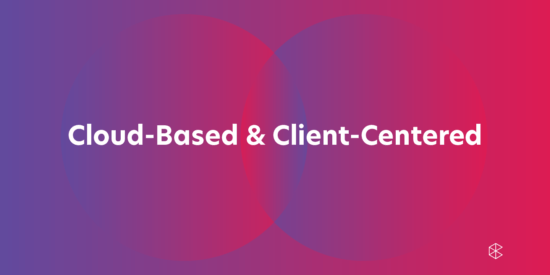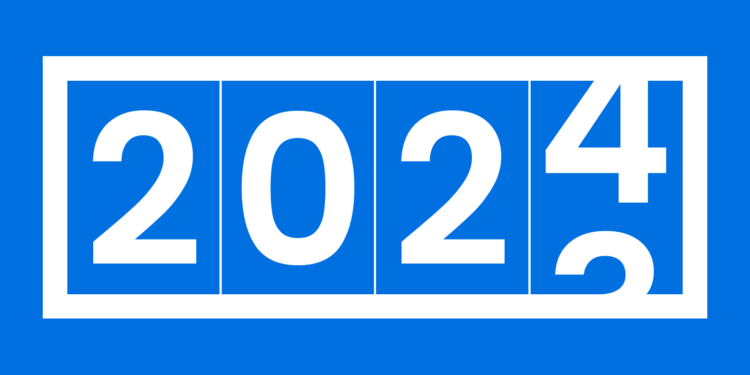With 4,500+ attendees from over 45 countries joining remotely, the eighth annual Clio Cloud Conference—and the first virtual one—is looking different this year. Acknowledging 2020’s sobering economic, political, and humanitarian challenges, Clio CEO and Co-Founder Jack Newton delivered an inspiring keynote that covered Clio’s vision for the future of legal services, recent additions to Clio’s product offering, and findings from the newly released 2020 Legal Trends Report.
The Reisman Awards

Every year, we’re proud to honor our customers and the amazing work they do in the legal community. Before starting his formal keynote, Jack revealed that Clio is delivering The Reisman Awards a little differently this year—he was proud to announce this year’s winners in his opening remarks. Also, Jack shared that throughout the Conference, The Reisman Award winners will be highlighted in featured spotlight sessions. A big virtual round of applause for this year’s winners:
- Best Growth Story: Donato Law
- Excellence in Client Service: Ceiba Fôrte Law Firm
- Community Champion: Osborn Gambale Beckley & Budd PLLC
- Legal Innovation: Roche Legal
- Best New Law Firm: Law Offices of Kristen A Schneck, LLC
Learn more about winners of The Reisman Awards here.
Rethink and redefine how we deliver legal services
Starting his keynote by acknowledging the current economic, political, and humanitarian landscapes, Jack invited lawyers and law firms to use this key moment in history to pivot as a society and legal profession. He encouraged law firms to rethink the future of legal services, to experiment and innovate, and figure out a way to navigate and thrive against the uncertainty. Jack shared an impactful quote to drive home what he meant:
“We will not go back to normal. Normal never was. Our pre-corona existence was not normal other than we normalized greed, inequity, exhaustion, depletion, extraction, disconnection, confusion, rage, hoarding, hate, and lack. We should not long to return, my friends. We are given the opportunity to stitch a new garment. One that fits all of humanity and nature.”
–Sonya Renee Taylor, award-winning poet, activist, and author
You may like these posts
Create a VUCA Prime environment out of a period of uncertainty
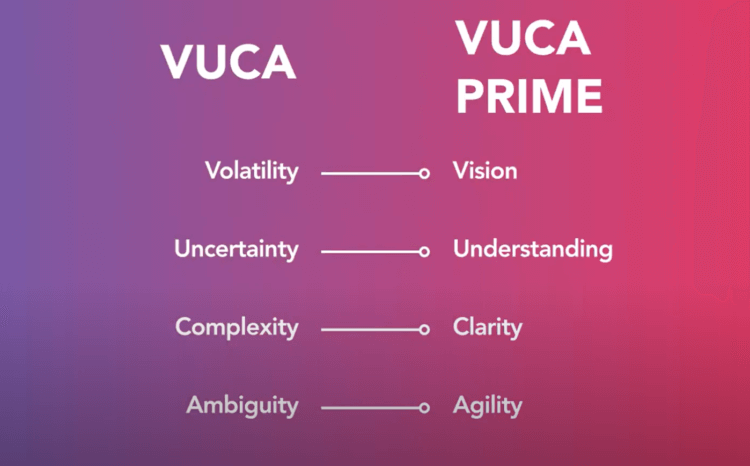
How should law firms find a way to thrive against the enormous uncertainty of 2020 and beyond? By creating a VUCA Prime environment to take advantage of the uncertainty. VUCA—volatility, uncertainty, complexity, and ambiguity—refers to coping in the chaotic and rapidly changing environment that businesses and organizations often find themselves in. VUCA Prime, on the other hand, is a model to help businesses and law firms thrive in a VUCA environment. It’s where law firms face an uncertain world by turning volatility to vision, uncertainty to understanding, complexity to clarity, and ambiguity to agility.
Why is creating a VUCA Prime environment key to thriving in 2020 and beyond? Despite its turbulence, a VUCA environment creates huge opportunities for innovation. Law firms need to recognize the amount of change happening in legal services—including massive shifts in client expectations—and adapt to meet those changes. This way, law firms will be able to find lasting success. As Jack shared:
“There’s an enormous opportunity to thrive on change. I know this is an enormously challenging environment to navigate. But there’s a concept called antifragility that Nassim Taleb introduced a few years ago. It is the concept that some things can benefit from big shocks. Some systems can thrive and grow when they’re exposed to volatility, disorder, and stressors. The VUCA Prime framework gives you the tools to thrive and succeed in this environment.”
Finding the fit between product and market
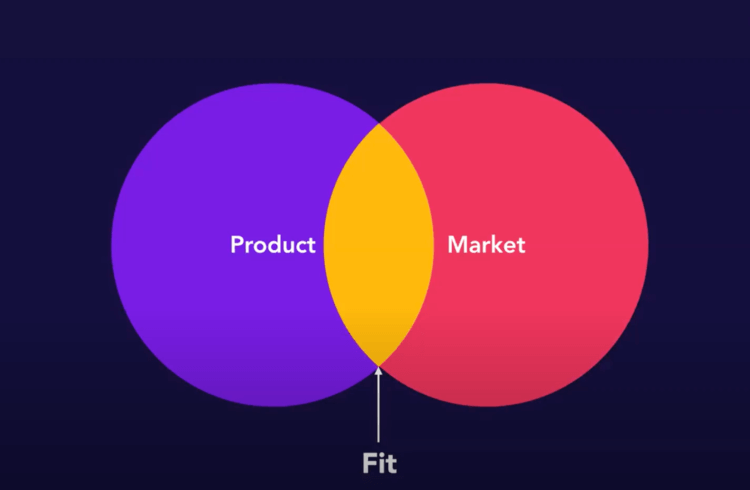
Jack invited attendees to view the access to justice gap—the inability for consumers to get the legal services they need—as primarily a product-market fit problem. The product is legal services, and the market is legal consumers who have a legal problem that needs solving. As Jack shared, 77% of legal problems don’t receive legal assistance. This highlights the extreme economic inefficiencies between the supply and demand for legal services.
What lawyers need to do now is to continue finding ways to bridge the gap between the legal product they provide (including both legal services and the client experience) and the market they serve, and build a blueprint for the future of their law firm.
The aggregation of marginal gains
The principle of the idea of the aggregation of marginal gains is that the adoption—and continuous application—of many small improvements will, over time, achieve meaningful, long-term change. The aggregation of marginal gains is a powerful framework that doesn’t just promise results—it opens up many paths to success. Any one action can create positive results down the road, but many actions can dramatically alter the course and speed toward improvement.
A positive tectonic shift amidst vast economic and human devastation
Against the enormous devastation of COVID-19, there is a positive tectonic shift. More than a decade’s worth of digital transformation has taken place in the last six months. For example, Zoom has gone from being virtually unknown to becoming a verb in the last six months. As Jack shared, 69% of consumers want attorneys to share documents with them online, and 37% of consumers now believe lawyers should be running their practice virtually. Jack also underscored that the most successful law firms have been aggressively pivoting and adapting to this new reality. A subset of consumers is similarly embracing and adapting to this new way of accessing/connecting their lawyers.
Highlights from the 2020 Legal Trends Report
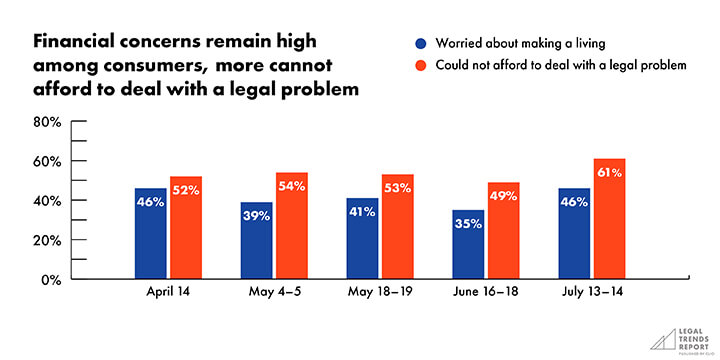
As the legal industry’s most in-depth analysis into the state of the legal practice, the 2020 Legal Trends Report uncovers what successful firms are doing to overcome the challenges of the pandemic, and how the move to a digital era of legal has changed consumer expectations. Jack highlighted the following from the 2020 Legal Trends Report:
- More consumers expect to need a lawyer soon. 23% of consumers say they expect to need a lawyer in the near future, compared to just 16% at the beginning of the pandemic. And 23% of consumers say they expect to need a lawyer for a COVID-19-related issue compared to just 13% at the beginning of the pandemic.
- Consumers are putting off legal problems. 67% of consumers say they would put off a legal problem during the pandemic, creating a huge backlog of legal issues.
- A significant portion of consumers think lawyers have stopped offering their services. In particular, at the beginning of the pandemic through April and May, 33% of consumers thought lawyers were not offering their services. In reality, only 2% of firms had stopped offering their services.
- Consumers are using more and more technology in their everyday lives. 50% of consumers say they’re more comfortable with technology than they were before the pandemic.
- Consumers expect lawyers to provide more remote legal services. 56% of consumers believe that most legal matters can be dealt with remotely, and would prefer to do it over a video call.
- Consumers want lawyers to offer payment plans. 61% of consumers said they would not be able to afford to deal with a legal problem, and 66% of consumers say that if they had to hire a lawyer, they would want to pay their fees on some sort of payment plan. Jack emphasized that this does not mean that consumers necessarily want cheaper legal services. Instead, this data shows that traditional law firm fees are priced and packaged in a way that does not meet consumers’ needs. With electronic, fixed fee payment structures, you can track time, create and send a bill, and get paid quickly.
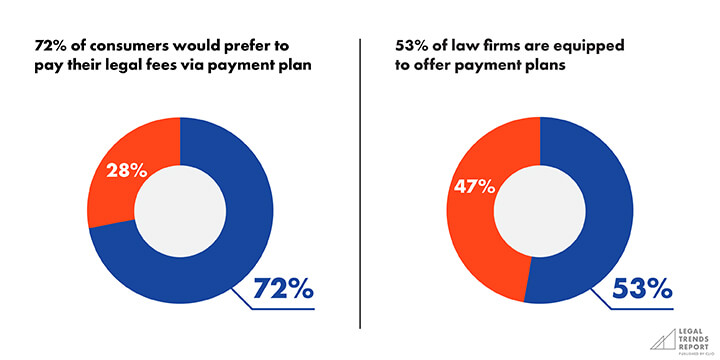
Download the 2020 Legal Trends Report.
The blueprint for your law firm of the future is cloud-based and client-centered
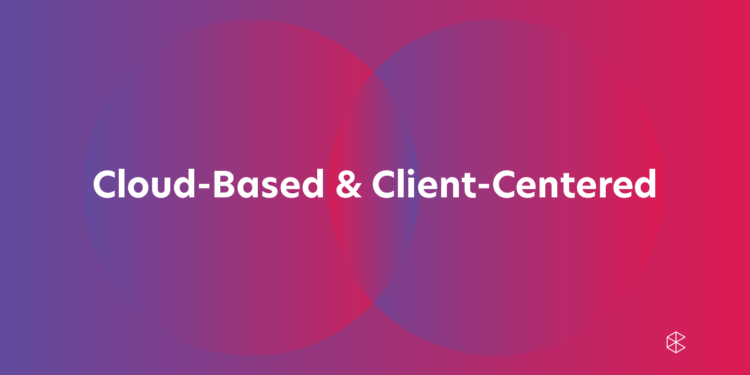
As Jack explained, the meaning of being cloud-based has shifted. No longer does it mean moving on-premise technology into the cloud. Now, being cloud-based means that your entire law firm has to operate in the cloud. This includes collaborating with colleagues, acquiring and connecting with clients, and getting paid all in the cloud. Moving to the cloud is no longer just innovative, it is now imperative to your law firm’s survival in this new environment. Jack acknowledged that although this goal won’t be realized overnight—it is what the legal industry is moving towards, and it is happening much faster in our current reality.
While the prevailing law firm model in the last millennia has been very lawyer-centered, the pandemic is presenting us with the opportunity to recreate legal services in a way that’s truly client-centered by design. Now and in the future, this means communicating and collaborating internally and with clients digitally, remote client intake, and bringing routine administrative work online. Law firms that embrace both a cloud-based and client-centered mentality will be best positioned to succeed going forward.
What’s new in Clio?
To better help lawyers connect with consumers and help them succeed as cloud-based, client-centered practices, Jack announced a number of new additions to Clio Grow and Clio Manage. With these new features, integrations, and updates, lawyers will be even better positioned to meet and service clients where and how they expect. Below are some highlights of what’s new and improved in Clio.
Clio for Clients (coming soon)

Jack also announced the upcoming Clio for Clients app, the first-of-its-kind for legal clients. This app is designed for clients to effortlessly and securely collaborate and communicate with lawyers, and easily share documents by using the built-in scanner. Once launched, your clients can simply download Clio for Clients from the App Store or Google Play.
Learn more about the upcoming Clio for Clients app.
*Clio for Clients is available for early access—exclusive to 2020 Clio Cloud Conference attendees. If you are a Conference attendee and the Primary Subscriber for your account, check your inbox for details and to opt in.
Microsoft Teams integration
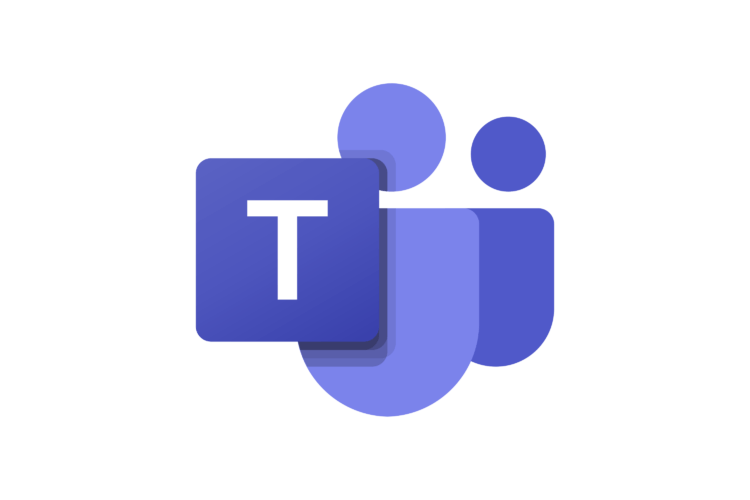
Law firms now need to be able to work remotely, and conversations that were previously held privately in person now need to continue in new channels that are secure and private. With Clio’s Microsoft Teams integration, law firms can stay connected and work collaboratively even in a distributed office environment. Microsoft Teams allows lawyers to deliver real-time collaboration where the work happens and see teams collaborating on a specific matter.
Learn more about Clio’s Microsoft Teams integration.
Zoom integration
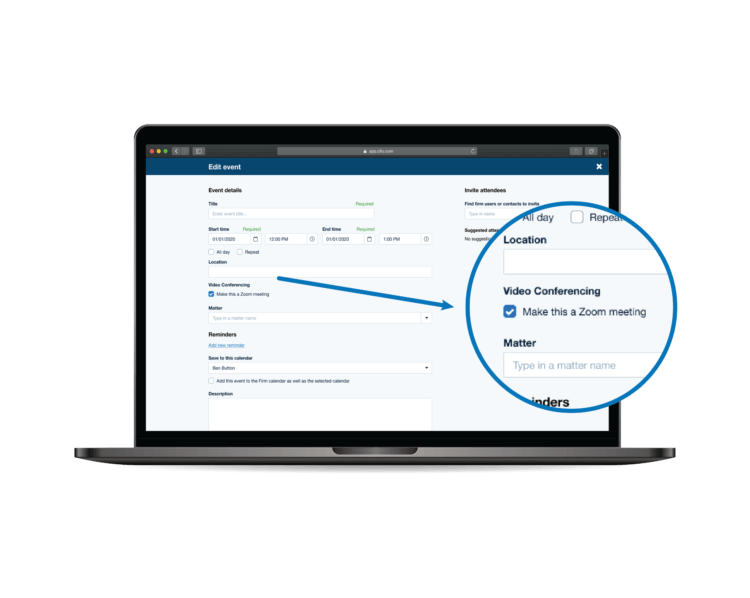
Distributed or remote working teams of lawyers, paralegals, and assistants need an easy way to communicate with each other to ensure collaboration and productivity as they work together to complete legal work. Clio’s Zoom integration offers customers an easy way to communicate via video conference with colleagues and clients. This integration will enable law firms to:
- Continue servicing clients and keep work moving ahead.
- Offer a video conferencing solution that is easy for their clients to use so it is accessible to all.
- Efficiently create and send meeting invites with the video conferencing details conveniently attached.
Learn more about Clio’s Zoom integration.
Dialpad integration
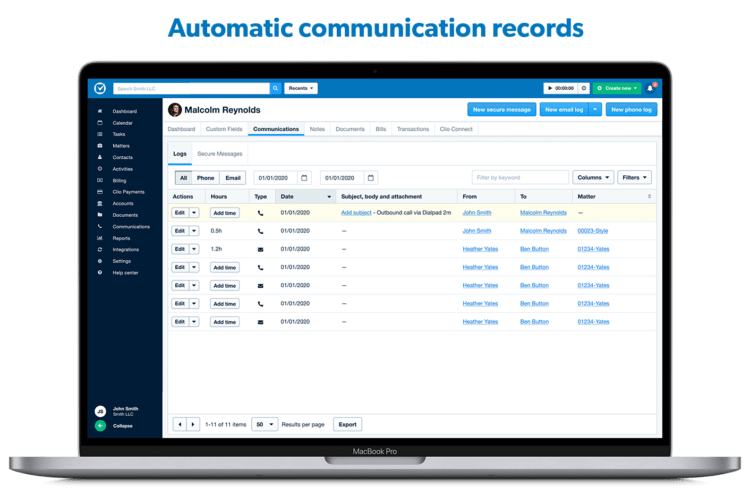
Instead of being tied to a physical phone system and landline—and manually recording and tracking time spent communicating on the phone—Clio’s Dialpad integration empowers your law firm to work remotely, while allowing you to rapidly scale the communication needs of your practice.
Jack explained that with Clio’s Dialpad Integration, Clio Manage will be able to automatically create records in the “communications” tab from phone calls made in either the Dialpad desktop or mobile application. This way, you can have all your calls show up directly in Clio Manage, and you can easily attach time to calls you’ve placed in Dialpad. Now, you can see what’s going on with phone communications in your firm at a glance
Learn more about Clio’s Dialpad integration.
Automated Bill Reminders
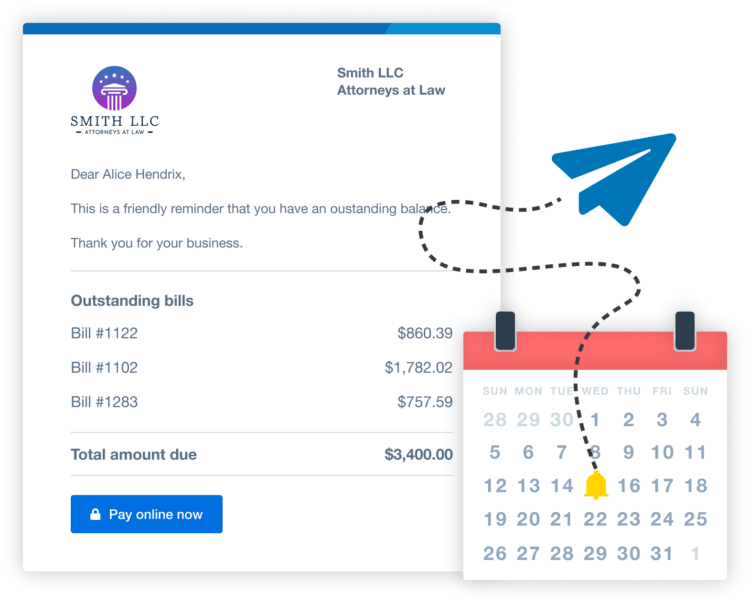
With the upcoming Automated Bill Reminders, lawyers can save time and get paid faster by automatically sending Outstanding Balances to their clients. Automated Bill Reminders will let lawyers bill recipients based on a customizable schedule.
Learn more about Automated Bill Reminders.
*Automated Bill Reminders is available for early access—exclusive to 2020 Clio Cloud Conference attendees. If you are a Conference attendee and the Primary Subscriber for your account, check your inbox for details and to opt in.
Updates and enhancements to Account Security
Jack was also excited to share that our new single sign-on functionality (SSO) lets you securely access Clio Manage, Clio Grow, and a subset of third party applications with a single username and password. With these updates and enhancements, you’ll no longer need to remember separate email addresses and passwords to access your Clio account.
For an added layer of security, Manage administrators can now also invite firm members to use two-factor authentication (2FA) and track who has it enabled from the new 2FA dashboard.
Learn more about the updates to Account Security.
Drive growth in your law firm flywheel with happy and returning customers
To close his opening keynote, Jack shared that law firms that lean into the cloud-based and client-centered way of thinking are better positioned to deliver better experiences to drive this growth flywheel—as explained in his book, The Client-Centered Law Firm. The goal is to provide a client-centered experience that results in more reviews, more referrals, and more new business for law firms—and even some returning clients. Law firms can do this by adapting and delivering experiences specifically calibrated to today’s changing consumer experience.
Order your copy of The Client-Centered Law Firm.
That’s it for Jack’s keynote! Stay tuned for more highlights from the 2020 Clio Cloud Conference.
We published this blog post in October 2020. Last updated: .
Categorized in: Clio
